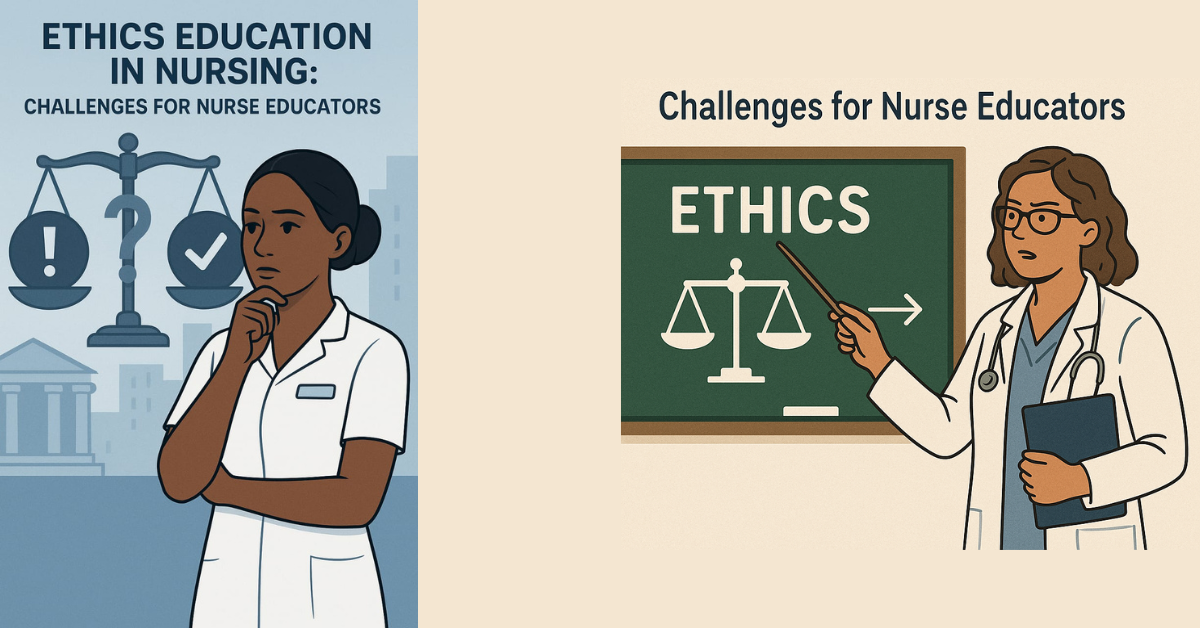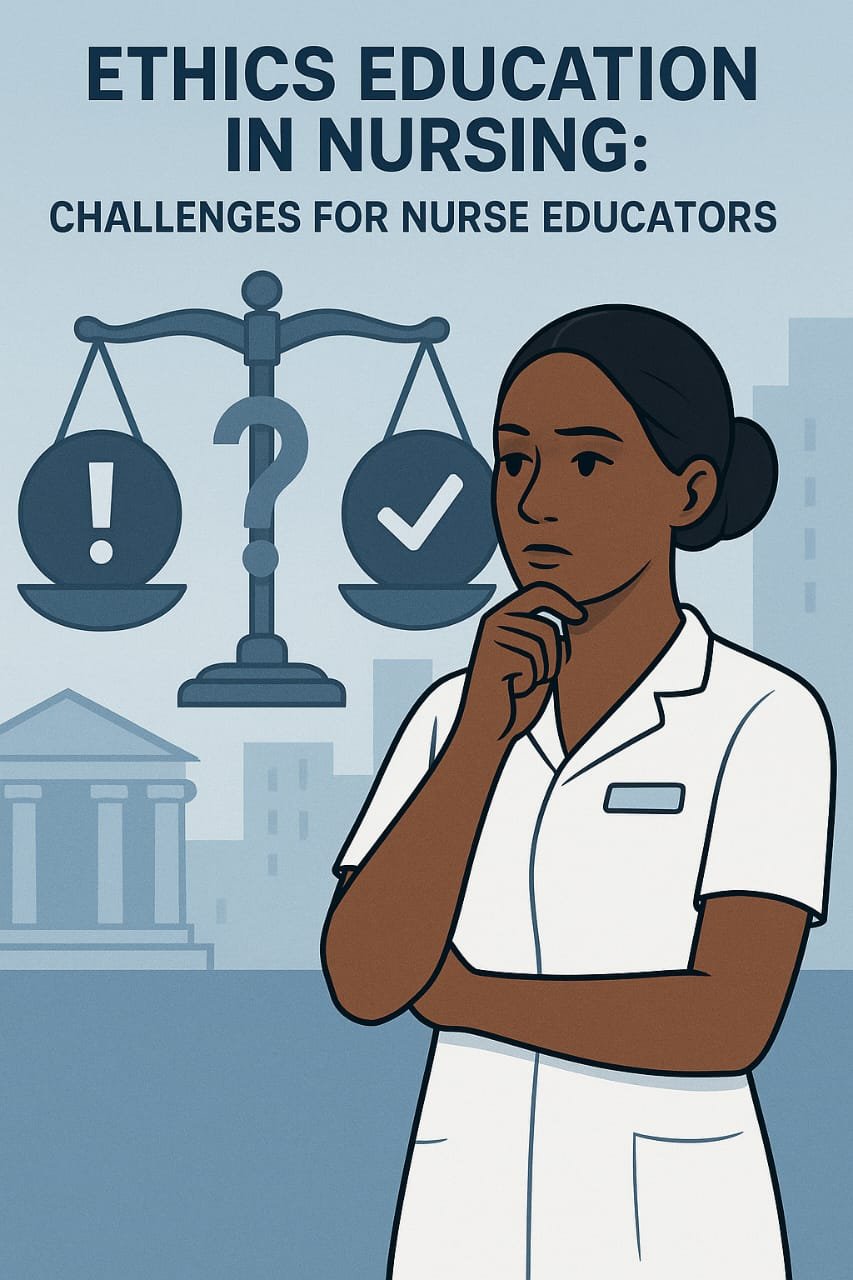The Ethics Education in Nursing: Challenges for Nurse Educators. Ethics education in nursing presents several challenges for nurse educators, including maintaining objectivity in grading, balancing constructive criticism with student morale, and addressing potential biases.
What are Ethics Education in Nursing: Challenges for Nurse Educators
Ethics education is an indispensable part of the nursing curricula since it teaches nursing students on how they may tackle thorny moral issues in the clinical practice. The nursing professors are the primary agents in the process of educating on the ethics in practice and thereby in inculcating moral reasoning among the future nurses.
As a matter of fact, the challenges to efficient delivery of ethics education notwithstanding, this are more easily said than done. The focus of this article is therefore to explore some important themes such as the essence of ethics education in nursing, the troubles the instructors experience, and the policies that can be used for combating these difficulties.
Educators also face difficulties in upholding academic integrity, handling ethical dilemmas arising from student issues, and accommodating diverse learning styles. Furthermore, there’s a gap between theoretical knowledge and practical application of ethics, making it difficult for students to identify and respond appropriately to ethical issues in clinical settings.
Importance of Ethics Education in Nursing
1. Professional Responsibility:
Nurses are often at the lead of patient care and must make decisions that affect patient outcomes. Ethics education helps them realize their professional commitment and the ethical principles that teach their practice.
2. Moral Reasoning:
Nursing requires confuse situations that need critical thinking and moral solving. Ethics education provides students with the skills to analyze situations, consider several assessments, and make informed decisions.
3. Patient Advocacy:
Nurses help as advocates for their patients, establish that their rights and requires are focused. Consideration ethical principles allow nurses to validity advocate for patients’ best interests.
4. Inter-professional Collaboration:
Ethics education encourages effective communication and cooperation with other healthcare professionals. Understanding ethical support encourages a shared commitment to patient-centered care.
Challenges in Teaching Ethics Education
1. Curriculum Integration:
Integrating ethics education into an already load nursing curriculum can be challenging. Nurse educators must learn ways to assimilate ethical principles within diverse subjects without immense students.
2. Diverse Perspectives:
Students come from various backgrounds with opposed cultural, religious, and personal beliefs. These differences can help to varying evaluation of ethical principles and create explain in discussions. Traversing these various perspectives while conserve a respectful and overall environment is a important challenge for educators.
3. Complexity of Ethical Issues:
Ethical problems in healthcare are frequently complicated and may not have clear-cut answers. Teaching students how to address these difficult situations require careful satisfaction and discussion, which can be time-consuming and challenging to administer.
4. Student Resistance:
Some students may be against to discussing ethical issues, mainly if they feel disagreeable confronting their values or beliefs. This opposition can delay open dialogue and check the effectiveness of ethics education.
5. Assessment Difficulties:
Estimating students’ concerning of ethics and their capability to apply ethical principles in practice can be challenging. Traditional assessment methods may not sufficiently capture students’ moral reasoning expertise or their ability to traverse ethical difficulty.
6. Lack of Faculty Training:
Some nursing faculty may have regular training in ethics education or incident in addressing ethical difficulty in clinical practice. This shortage of expertise can affect the condition of ethics education conveys to students.
7. Keeping Up with Ethical Issues:
The healthcare prospect is always evolving, with new ethical issues appearing regularly. Nurse educators must stay modern with these developments to provide suitable and timely ethics education.
Strategies to Overcome Challenges
1. Curriculum Development:
Cooperating with faculty across disciplines to produce an integrated curriculum that intensify ethics can increase the effectiveness of ethics education. Multifaceted approaches can prepare students with a all-around understanding of ethical principles.
2. Facilitating Open Discussions:
Construct a safe and respectful environment for open dialogue can stimulate students to share their understanding and attract in meaningful discussions about ethical issues. Team agreements for discussions can lead encourage a supportive atmosphere.
3. Case-Based Learning:
Utilizing case studies and real-life framework can make ethics education more applicable and attractive for students. Case-based learning stimulates critical thinking and leads students apply ethical principles in active situations.
4. Professional Development for Educators:
Providing faculty with training and assets on ethics education can increase their confidence and knowledge in teaching this important subject. Workshops, seminars, and mutual learning opportunities can help faculty development.
5. Innovative Assessment Methods:
Investigate alternative assessment methods, include reflective reviews, peer assessments, or group discussions, can prepare a more complete evaluation of students’ ethical reasoning and decision-making skills.
6. Continuous Engagement with Current Issues:
Assimilating current ethical difficulty and case studies from modern healthcare practice can keep ethics education applicable and attractive. Regular updates and discussions about appearing ethical issues can increase students’ understanding of the effective nature of ethics in nursing.
7. Mentorship and Support:
Organizing teaching programs can provide students with opportunities to discuss ethical difficulty with experienced nurses. Mentors can teach students in traversing elaborate ethical situations in practice.
Conclusion
Ethics education is very important for nursing students as it helps to face them with the moral issues they might come across in their career. Teachers who are in the nursing field are likely to have many difficulties in the process of ethics education but there are some techniques that they can utilize to make the learning session successful for students.
One of the ways in which educators can ensure that nurses receive the ethical reasoning skills required to carry out their work is by creating a supportive and mindset-encouraging arena where ethical dimensions are the order. Moreover, these skills can be put into the curriculum, and the teachers can get some training so that they are in a position of sharing out the skills and knowledge to the next generation of nurses.
A subject-centered and respectful environment for the critical discussion of questions is a very important tool for developing the required choice of ethical practices that will be beneficial for the patients, as well as for the preservation of the nursing profession’s good reputation at the same time. At the end of the day, the strong dedication to ethics education will bring about not only a better treatment of patients but also the preservation of the nursing profession’s integrity.
Read More:
https://nurseseducator.com/didactic-and-dialectic-teaching-rationale-for-team-based-learning/
https://nurseseducator.com/high-fidelity-simulation-use-in-nursing-education/
First NCLEX Exam Center In Pakistan From Lahore (Mall of Lahore) to the Global Nursing
Categories of Journals: W, X, Y and Z Category Journal In Nursing Education
AI in Healthcare Content Creation: A Double-Edged Sword and Scary
Social Links:
https://www.facebook.com/nurseseducator/
https://www.instagram.com/nurseseducator/

